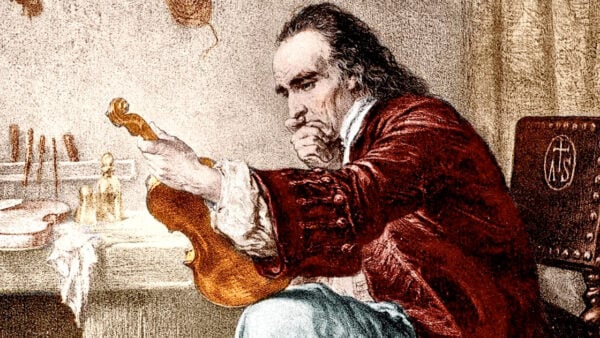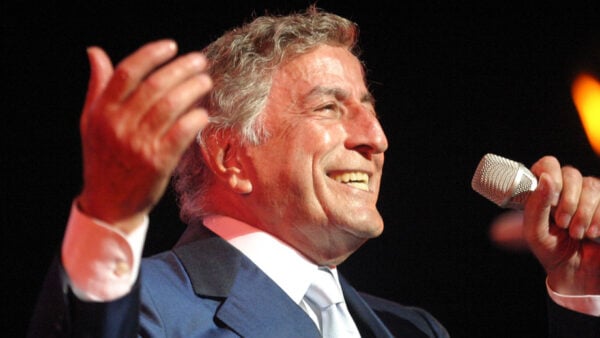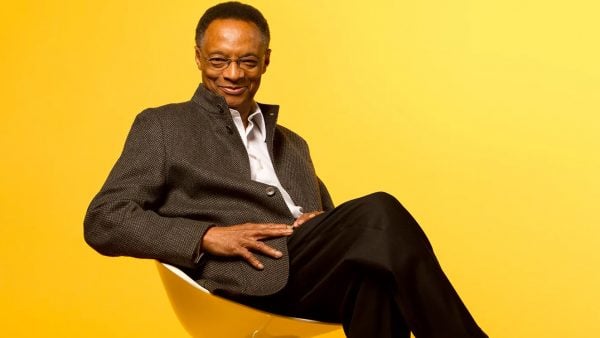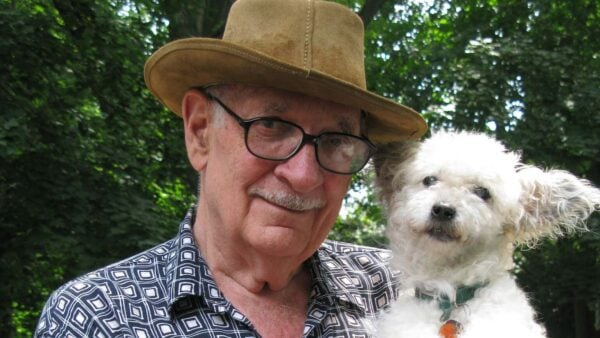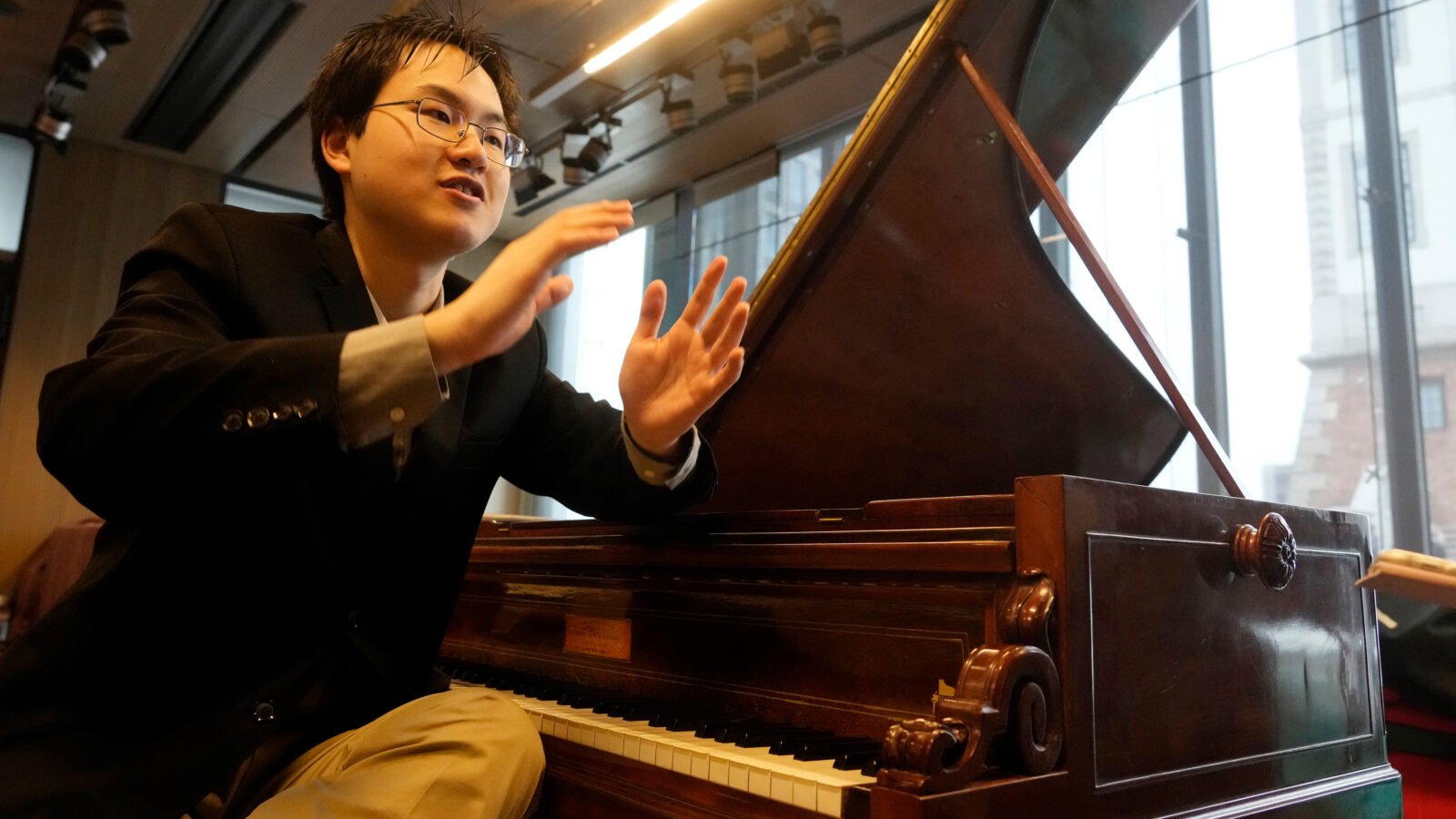
Canadian pianist Eric Guo talks to The Associated Press about playing music by Frederic Chopin on 19th century pianos, including one owned by the Romantic-era composer, to mark Chopin’s 214th birthday, at the Fryderyk Chopin Institute, in Warsaw, Poland, Saturday, March 2, 2024. Guo won a quintannual competition to play Chopin on period instruments organized by the Institute. (AP Photo/Czarek Sokolowski)
WARSAW, Poland (AP) — Pianist Eric Guo did everything but travel through time to commune with Chopin.
On March 1, the day celebrated as Frederic Chopin’s birthday, the 21-year-old Canadian played one concert at the birthplace of the Romantic-era piano virtuoso and composer, on a piano built during his lifetime. Then he went into town for a second performance, during which he used a piano that once belonged to Chopin.
“You cannot get more connected to Chopin than being in his birth place,” said Guo.
A student at the The Royal Conservatory of Music in Toronto, Guo was invited to give the special performances to mark Chopin’s 214th birthday after winning the second Frederic Chopin Competition on Period Instruments. He gave a pair of recitals on the day, one at the manor house in Zelazowa Wola where Chopin was born in 1810, now a museum, and the other at the National Philharmonic in Warsaw.
“It’s probably exactly the same room he was born in, so, it’s, you know, spiritual connection,” Guo said. “I really feel one with Chopin.”
Poland’s Fryderyk Chopin Institute — which uses the Polish spelling of the composer’s name — began the period instrument competition in 2018 to promote historically informed performances of Chopin’s music that use 19th century pianos or modern reproductions. It’s held every five years.
It’s part of a wider trend toward period instruments, as experts and audiences try to figure out what the music pieces sounded like to their own composers. Some claim that changes in how instruments are designed and played nowadays have erased subtleties in the music; others just enjoy a new spin on familiar classics.
Pianos made in the 18th and 19th century were simpler, lighter and smaller than modern instruments, with narrower keys and lighter strings. The result is they play more softly than modern pianos.
“These period pianos, they all have the ability to play as soft as possible and I think still there’s something there, there is still a core inside,” Guo told The Associated Press last weekend.
In a period instrument “I like the colors that it can create and the sound is, you know, out of this world,” said Guo. Modern pianos, by contrast, tend to prioritize strong, powerful sound, he said.
Contemporary grand pianos are reinforced with metal to withstand the force of much tauter and thicker strings and larger and more complex hammers mechanisms, for a sound that carries well in large concert halls, but also has a different quality.
Guo enjoys playing both. “It works both ways: the period helps the modern and vice versa.”
In Warsaw, Guo performed a solo version of Chopin’s Concerto in F Minor on a contemporary replica of an 1830 Pleyel piano made by Paul McNulty, and the Preludes on Chopin’s last piano, an 1848 Pleyel. Chopin’s own piano, Guo said, has a “velvet” sound and makes it possible to get the “kind of touch that Chopin would have really sought.”
Chopin’s music demands subtlety from both instrument and performer, Guo said. “He always emphasized that everything should be with ease and always free, and never to produce a hard sound, and never for the sake of virtuosity. Virtuosity, technique serves the music.”
That’s not to say the music is easy. “Chopin knew about the piano and he wrote for the piano” and a lot of his work is “just technically taxing, exhausting, he really demands a lot,” Guo said.
Whether Chopin was actually born on the day he celebrated as his birthday is a matter of some dispute among his biographers. His birth certificate bears the date Feb. 22, 1810, but his family celebrated on March 1.
Chopin was considered a musical genius from an early age, and in 1830 left Warsaw for Vienna to broaden his education and his audience. He eventually settled in Paris, giving concerts, teaching the piano and composing music, some based on Polish dances like the polonaise and the mazurka. He died on Oct. 17, 1849 and was buried at the Père Lachaise cemetery in Paris. His heart is at the Holy Cross Church in Warsaw.
Guo said people in the tumultuous 21st century need music more than ever.
“All those wars going on, fights: music really bonds us, unites us as a humanity and society. Kind of heals us, cures all the stresses and all the challenges.”
Following his competition win in Warsaw in October, Guo’s schedule is busy with concerts from Japan to European countries, to the United States. He’s hoping to finalize plans for concerts in China, his family’s ancestral home, this fall.
“Schedules are quite packed and yes, more than before, but I’m still who I am, you know, I’m still living, surviving, and I’m human still, despite everything.”
Monika Scislowska for the Associated Press

